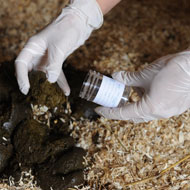Horse owners reminded to carry out faecal worm egg counts

Faecal worm egg counts (FWECs) should be carried out every six to eight weeks over the summer.
Over a third of horse owners never carry out faecal worm egg counts, according to a recent survey
According to a recent survey, more than a third of horse owners never carry out faecal worm egg counts (FWECs).
Nearly 600 horse owners participated in the survey by the British Riding Clubs early in 2014. It consisted of 21 questions on general horse health, care and management.
Animal health company Zoetis, who commissioned the survey, have spoken out to remind horse owners of the value of FWECs for controlling worms in mature horses.
In mature horses, the animal health company recommends FWECs should be carried out every six to eight weeks during May to September, however 36 per cent of participants admitted to never employing this method.
Zoetis vet Wendy Talbot said: "The survey results are worrying, indicating that a high number of horse owners are still unaware of the most efficient and responsible way to control worms.
"It’s so important that they should discuss their worming programme with their vet or a Suitably Qualified Person (SQP) to understand the role of FWECs and to make sure they choose the right methods and products for their horse’s circumstances.”
According to the company, FWECs are useful to differentiate between horses that need dosing for redworm and those that don’t. The counts also show how many eggs each horse is contributing to the contamination of the pasture. A high egg count leads to more larvae hatching on the pasture, and a higher risk of reinfection of other horses with worms.
The FWEC approach protects the health of horses that are infected with worms, and saves the owner from the cost of worming uninfected horses unnecessarily.
It is important to weigh horses before worming, Zoetis says, to ensure the correct dose is administered, as under-dosing could lead to increased resistance of the horse to the wormer.



 The Federation of Independent Veterinary Practices (FIVP) has announced a third season of its podcast, Practice Matters.
The Federation of Independent Veterinary Practices (FIVP) has announced a third season of its podcast, Practice Matters.